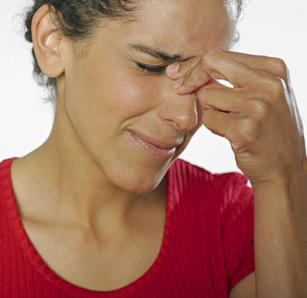


Sinusitis
Sinusitis is a common condition that can affect people of any age.
Main symptoms of sinusitis:
•
a blocked or runny nose
•
facial pain and tenderness
•
a high temperature (fever) of 38°C (100.4°F) or more
•
a sinus headache
The sinuses
You have four pairs of sinuses in your head.
1.
behind your forehead
2.
either side of the bridge of your nose
3.
behind your eyes
4.
behind your cheekbones
Picture courtesy of Everydayhealth.com
Sinuses open into your nasal cavity & help control the temperature and
water content of the air reaching your lungs.
The mucus that's naturally produced by your sinuses usually drains into
your nose through small channels. These channels can become blocked
when the sinuses are infected and inflamed.
The sinuses behind the cheekbones (the largest ones) are most
commonly affected.
What causes sinusitis?
A viral infection is the most common cause of sinusitis. It's usually the
result of a cold or flu virus that spreads to the sinuses from the upper
airways. Following a cold or flu, a secondary bacterial infection can sometimes develop, causing the membranes that line
the inside of the sinuses to become inflamed.
An infected tooth can also sometimes cause the sinuses to become infected.
Diagnosing sinusitis
Most of you will know when you have sinusitis. If in doubt your doctor can confirm it from your symptoms (a blocked or runny
nose with facial pain). If you have severe or recurring sinusitis, your doctor may refer you to an ear, nose and throat (ENT)
specialist who will try to determine the underlying cause for the recurrence. The specialist may use a piece of equipment
called a nasal endoscope to examine the lining of your nose and sinus openings.Sometimes he may request a CT scan to
check the sinuses that can't be seen by an endosciope.
Treating sinusitis
Around two thirds of people with sinusitis don't need to see their doctor. In most cases, the viral infection clears by itself. It
normally takes takes about two-and-a-half weeks to clear up (longer than a cold). If you have mild sinusitis, over-the-counter
painkillers and decongestants will help relieve your symptoms.
See your doctor if your symptoms don't improve after seven days, if they're getting worse, or if your sinusitis keeps coming
back. In such cases, antibiotics or a steroid spray may be prescribed.

